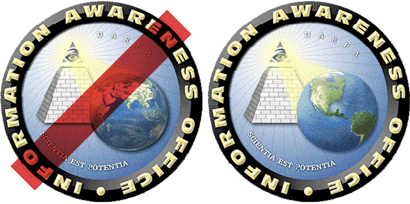
A slight change of focus…
(also check out Part 1 Part 2 and Part 3)
You may recall that a nefarious global spying program called “Total Information Awareness”, spearheaded by convicted Iran-Contra criminal Vice Adm. John M. Poindexter, was exposed in 2002 by the New York Times.
After this program was made public, there was a great outcry by Senators, Congressmen, and pundits both from the left and the right. The consensus at the time was that the program, as conceived, was illegal and would require new legislation in order to become legal.
The Republican-led Congress decided they did not want to change our existing civil liberties legislation (except for what they passed in the Patriot Act), so in 2003 they banned the TIA program and Poindexter was let go. In fact, Congress even banned programs like TIA, specifying that they would not fund…
“…the program known either as Terrorism Information Awareness or Total Information Awareness, or any successor program, funded by the Defense Advanced Research Projects Agency, or any other Department or element of the Federal Government…”
Much of the new NSA program resembles Total Information Awareness, and many suspect they simply moved the program from the Defense department to the NSA, where Congress wouldn’t know about it.
It looks like the Bush Administration learned a valuable lesson: If you want something that Congress or existing laws won’t let you have, then just do it on your own and don’t tell anyone about it.
Trust but verify.
Bush and his defenders say that we should simply trust them to do the right thing. Frankly, I don’t trust them. And I wouldn’t blame a Republican for feeling the same way about a Democratic-controlled administration. The only way to trust our government is through the verification structures built into the system. It’s not enough for the Administration to “notify” certain members of the house leadership, especially if those elected representatives are legally-bound to not discuss what they’ve been told, much less debate it.
If the NSA thinks they can do something with the telcos’ phone records to fight terrorism, then Congress must approve the plan first. Period.
Why? Because the debate produces better ideas and better plans. The New York Times yesterday had a critique of the program on technical (not moral or political) grounds that was a great example of the real value of open debate. The peice basically argues that the program, with it’s many conceptual and functional flaws, can’t really help us fight terrorism anyway, and may well be a waste of money. So even if you think the program is perfectly fine ethically, is it worthwhile to spend millions or billions on a program that doesn’t work? Shouldn’t Congress decide that?
It does NOT have to be this way.
Also, the program doesn’t have to be quite so invasive into the privacy of the innocent. Mash at docstrangelove.com blog describes a method of using telco phone records to locate/connect Bad Guys without revealing innocent people’s phone numbers. In fact, as bad as it was even the Total Information Awareness project had planned for some degree of privacy, as this recent Slate argue discusses:
Poindexter envisioned a “privacy appliance,” a device that would strip any identifiers from the information—such as names or addresses—so that government miners could see only patterns. Then if there was reason to believe that the information belonged to a group that was planning an attack, the government could seek a warrant and disable the privacy control for that specific data. TIA funded research on a privacy appliance at the Palo Alto Research Center, a subsidiary of Xerox Corp. “The idea is that this device, cryptographically protected to prevent tampering, would ensure that no one could abuse private information without an immutable digital record of their misdeeds,” according to a 2003 government report to Congress about TIA. “The details of the operation of the appliance would be available to the public.”
The NSA’s domestic eavesdropping program, however, appears to have none of these safeguards.
Now I don’t trust this “privacy appliance” at all, but at least they tried and at least they understood that accountability was also part of the equation. The NSA and other spy agencies are of critical importance to America’s national security, but they are only useful to the extent that they can be overseen by our elected officials in multiple branches of government and held accountable for everything they do.
These are the cornerstones of the American system of government: Civil rights and accountability. It’s bad enough that the Bush Administration tramples all over the former, but without the latter we’re basically a dictatorship.
Go to “NSA Data Mining 1: If you aren’t against it, then you don’t really understand it.”
Go to “NSA Data Mining 2: So you think you have nothing to hide?â€
Go to “NSA Data Mining 3: Wiretaps? Maybe not. Stakeouts? Definitely.“
Comments
One response to “NSA Data Mining 4: Total Information Awareness, Resurrected”
Check out this poster advertising the punchcards that were used in Nazi deathcamps (created & supplied by IBM):
http://www.jewishvirtuallibrary.org/jsource/images/Holocaust/Dehomag_Poster.jpg
good people, huh?